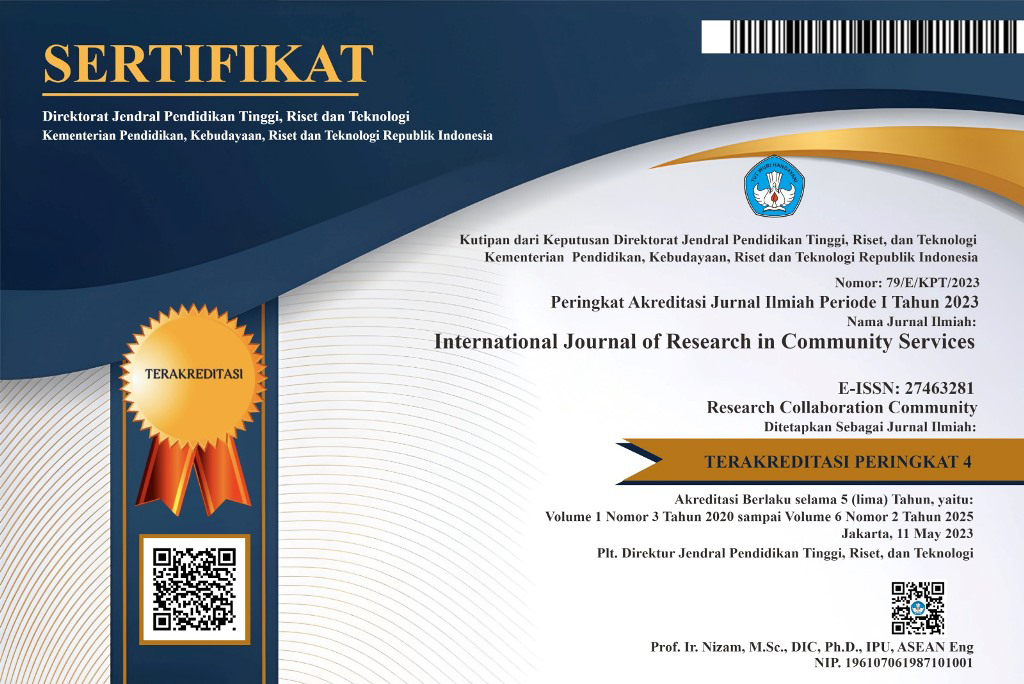Spreading Love in Fitra Qaseh Refuge Home Malaysia: A Community Service Activity
Abstract
Fitra Qaseh Orphanage is a shelter for children who have been abandoned by their parents due to social problems within the family. Fitra Qaseh Orphanage which is known as the Fitra Qaseh Refuge Home is located in Johor Bahru City, Malaysia. Fitra Qaseh currently currently accommodates 53 children ranging from 1 month to 17 years old. The problem that faced by Fitra Qaseh is the development of facilities for the residents' outdoor play and activities. Fitra Qaseh outdoor activities, providing motivation for residents of Fitra Qaseh shelter homes in the form of in the form of education, religious knowledge, protection and affection, Providing assistance to fulfil the daily needs of residents both food and fulfil the daily needs of residents both food and clothing for daily needs residents of the Fitra Qaseh protection house. For this reason, Ibrahim Sultan Polytechnic (PIS) and Politeknik Negeri Padang (PNP) collaborate in the context of international community service International. The aim of this collaborative community Service activity is to address issues that arise at the orphanage. The community service is implemented using the applicative method, which directly solves the problems that exist in partners. The step of activity is survey, collecting data, plan resolve the problem and action. The result of this program are The results of this activity are that the facilities and infrastructure of the orphanage have been repaired, assistance has been provided and children have been motivated to keep learning to reach their goals.
Keywords
Full Text:
PDFReferences
Ahad, R., Ara, S., & Shah, S. A. (2016). Self-concept and aggression among institutionalized orphans of Kashmir. The International Journal of Indian Psychology, 3(2), 104-116.
Daiute, C. (2017). The rights of children, the rights of nations: Developmental theory and the politics of children’s rights. In Children's Rights (pp. 405-427). Routledge.
Fatima, A., Iqbal, A., Hayat, U., Javed, S., Khan, K., & Zahra, K. (2023). Comparison of Meaning in Life and Self-control between Orphans and Non-orphans. Bulletin of Business and Economics (BBE), 12(3), 811-814.
Gilburt, H., Rose, D., & Slade, M. (2008). The importance of relationships in mental health care: A qualitative study of service users' experiences of psychiatric hospital admission in the UK. BMC health services research, 8(1), 1-12.
Hailegiorgis, M. T., Berheto, T. M., Sibamo, E. L., Asseffa, N. A., Tesfa, G., & Birhanu, F. (2018). Psychological wellbeing of children at public primary schools in Jimma town: An orphan and non-orphan comparative study. PloS one, 13(4), e0195377.
Harker, R. M., Dobel‐Ober, D., Lawrence, J., Berridge, D., & Sinclair, R. (2003). Who takes care of education? Looked after children's perceptions of support for educational progress. Child & Family Social Work, 8(2), 89-100.
Research, T. S. P. U. O. (2008). The effects of early social-emotional and relationship experience on the development of young orphanage children. Monographs of the Society for Research in Child Development, 73(3), vii.
DOI: https://doi.org/10.46336/ijrcs.v5i2.595
Refbacks
- There are currently no refbacks.
Copyright (c) 2024 International Journal of Research in Community Services

This work is licensed under a Creative Commons Attribution 4.0 International License.
Published By:
IJRCS: Jalan Riung Ampuh No. 3, Riung Bandung, Kota Bandung 40295, Jawa Barat, Indonesia
Indexed By:

This work is licensed under a Creative Commons Attribution 4.0 International License.
View My Stats








